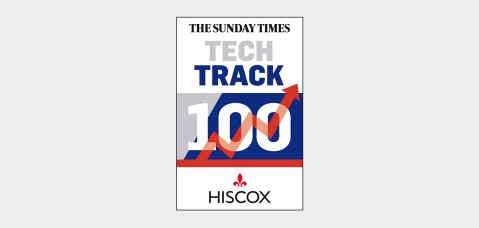This year’s Sunday Times Hiscox Tech Track 100 list of the UK’s fastest growing technology companies was released at the weekend, with trading technology company LMAX Exchange topping the list. Once again Tech Track provides a fascinating snapshot of how the technology sectors are evolving in the UK today.
We’ve been writing technology businesses for over 20 years and sponsoring Tech Track for the past three years. It’s a very logical fit for both of us. Like Hiscox, the companies on the list are challenging convention. They’re at the forefront of driving the UK forward through digital, technological innovations that bring a new, competitive advantage to market. They are companies we admire and are uniquely positioned to help.
What this means is bringing our experience in technology to underwriting these often quite unique risks posed by disruptive technologies. It would be easy to sit back and only look to insure a company who’ve come up with a new word processing app, for example, that’s straightforward from a risk perspective. But then you get the companies who are genuinely different from anything that precedes them, and that’s where the challenge comes in.
One company that highlights these challenges is MoFilm, ranked at 83 in the list. They may be ostensibly described as an advertising agency, but the nature of their business, which involves users producing multimedia for brands and social causes presents plenty of challenges. Like many on the list, they’re a fantastically innovative company with new exposures, whether that’s in terms of intellectual property or data privacy.
In some respects, it’s no surprise to see many of the names on the list, such as Cloud Distribution and CloudSense at numbers 4 and 7 respectively and the pithily-named Hide My Ass! at number 9. These companies reflect a growing trend for businesses to increasingly turn to the cloud for their hosting requirements and recognition for companies to improve their cyber security, especially with potentially tougher EU regulations coming in for data breaches. That these companies are placed in the top ten is a reflection of the needs of the wider business community.
What’s perhaps more surprising is the absence of firms from specific sectors. To take one example, while there are some online payday loan lenders featured, this is becoming a lot tougher to break into. Not only are there a small number of dominant players in this sector, it’s a little easier to secure credit from banks. This doesn’t mean there’s no growth to be had in this market, but it does explain why they’re not as prevalent as they once were. Just as with cyber security, non-tech forces can shape the list.
Of course the list still has the traditional IT consultancies (although these are increasingly moving to offer security) and the manufacturers but, as per the 2013 list, there’s many more traditional services presenting themselves as tech companies. Whether that’s smartphone apps, digital marketing agencies, or finance comparison site, they’re essentially taking the offline into the online space.
But as these businesses change, so do their risk and exposure. Apps may be helping us with everyday tasks, but their insurance needs are far from everyday. They’re often game changing, both for what they deliver to consumers and how we need to write their risk.
You can read more analysis from Matt Webb and others on Tech Track at the Hiscox Small Business Blog




